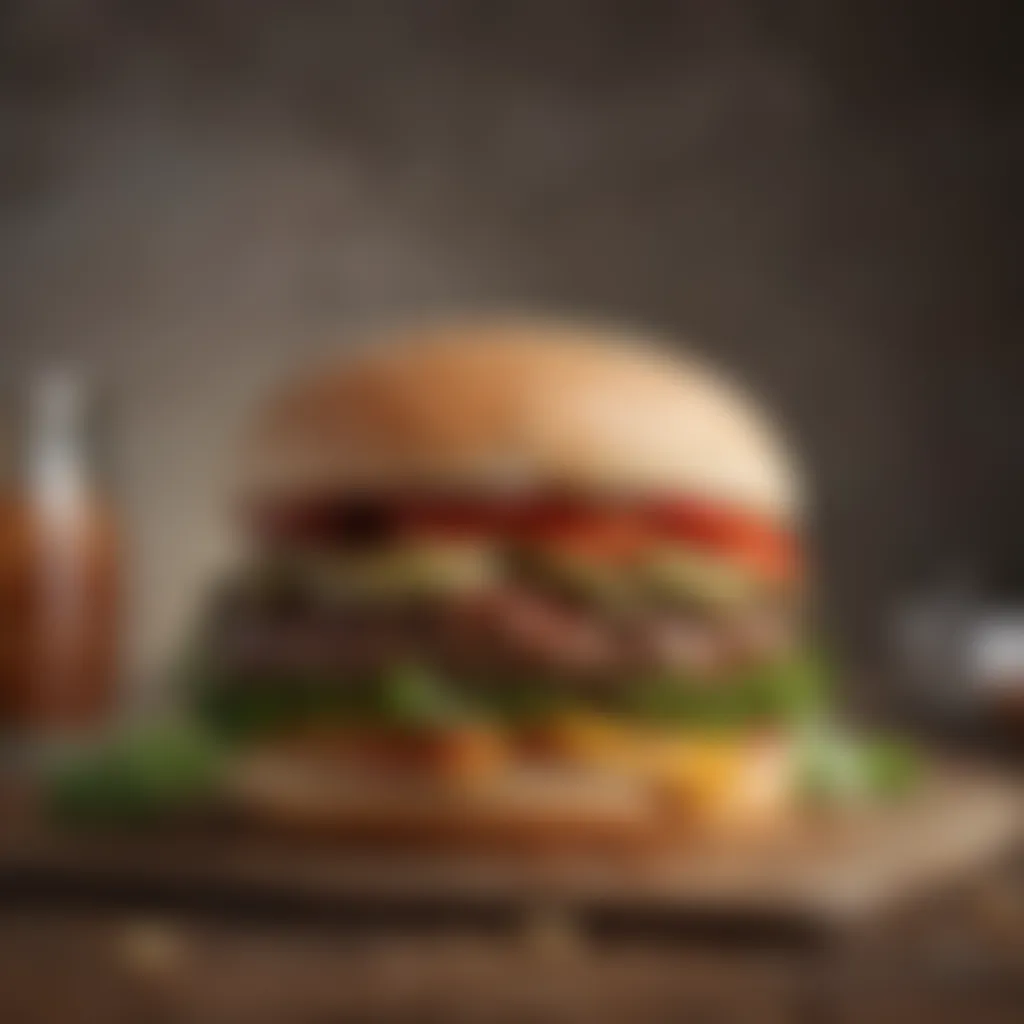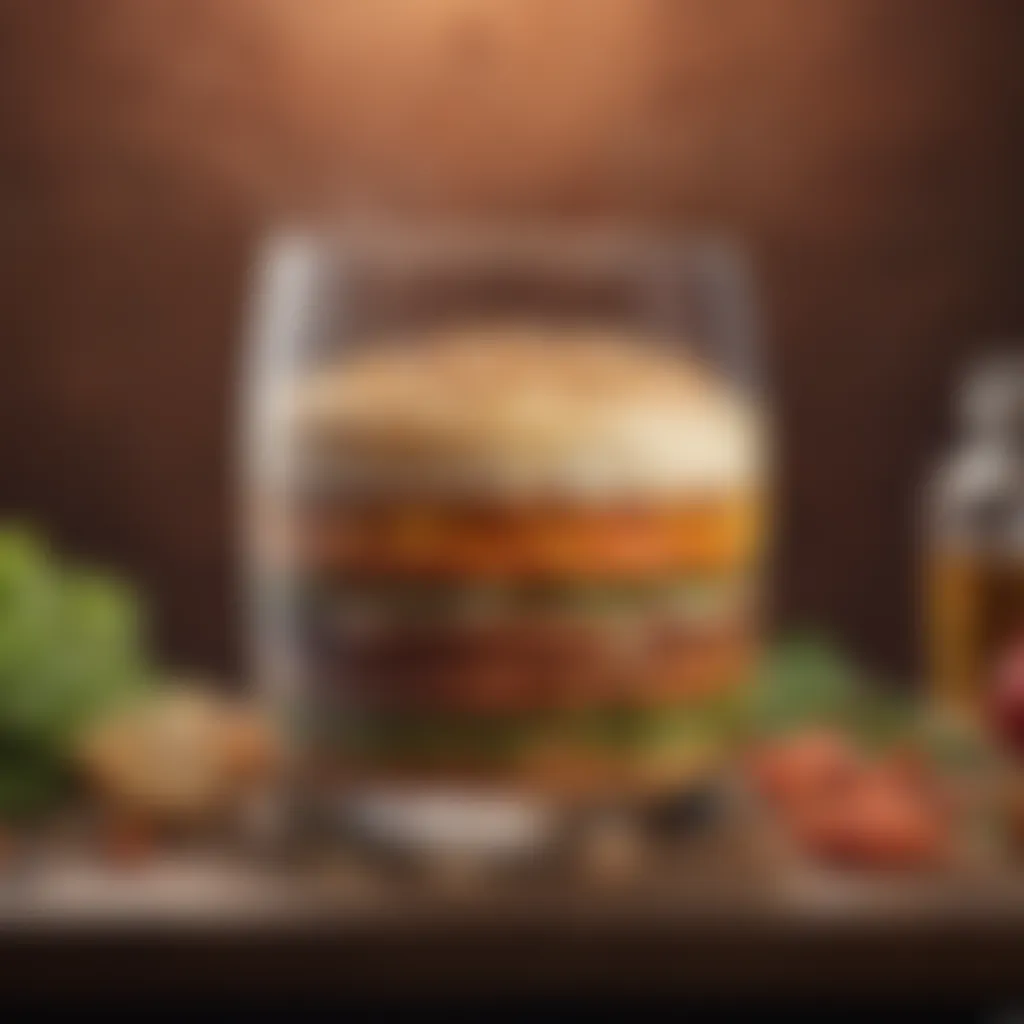Foods and Drinks That Cause Bloating: A Comprehensive Guide


Intro
Bloating is a common issue that many individuals experience. It can be uncomfortable and often embarrassing. Understanding which foods and drinks cause bloating is crucial for managing this digestive condition effectively. This article provides insight into specific items that may lead to bloating and offers strategies to alleviate the discomfort that comes with it. By examining the biological mechanisms that contribute to bloating, we empower readers to make informed decisions about their diet and improve their overall digestive health.
Ingredients:
When it comes to understanding bloating, it is essential to identify specific ingredients that are known to contribute to this issue. Common foods and drinks that can lead to bloating include:
- Beans: They are high in fiber and can produce gas in the digestive system.
- Cruciferous Vegetables: Such as broccoli, cauliflower, and Brussels sprouts, these can be hard to digest for some people.
- Carbonated Beverages: The bubbles in soda and sparkling water can contribute to a feeling of fullness.
- Dairy Products: For those with lactose intolerance, dairy can lead to discomfort and bloating.
- Wheat: Gluten intolerance or sensitivity can cause bloating in many individuals.
- Artificial Sweeteners: Items like sorbitol and mannitol can lead to digestive distress.
Preparation Steps:
Step 1: Identify your triggers
- Keep a food diary.
- Note which foods lead to bloating and at what quantity.
Step 2: Monitor your portion sizes
- Eating smaller portions can help minimize bloating.
- Focus on how your body reacts to changes in portion sizes.
Step 3: Choose alternatives
- If you are sensitive to specific foods, consider alternatives.
- For instance, try lactose-free dairy products or gluten-free grains.
Technical Aspects:
Temperature Settings:
- If cooking, ensure proper temperatures are set.
- Watch for the right cooking temperatures for steaming vegetables or boiling beans to reduce gas production.
Timing Specifics:
- Be conscious of eating times.
- Eating too quickly can lead to swallowing air, exacerbating bloating.
Critical Techniques:
- Soaking beans before cooking can help reduce bloating.
- Steaming vegetables rather than boiling can preserve nutrients while aiding digestion.
Troubleshooting Tips:
If you find that bloating persists despite making changes:
- Consider reducing fiber intake gradually to allow the system to adjust.
- Drink plenty of water to help flush out your system and facilitate digestion.
- Consult with a healthcare provider if bloating remains a frequent occurrence, as it can indicate underlying issues.
Understanding the foods and beverages that lead to bloating allows you to make educated choices about your diet, ultimately helping you to avoid discomfort.
By identifying and addressing specific dietary components, it is possible to significantly reduce the incidence of bloating and improve overall digestive health.
Understanding Bloating
Bloating is a subject that affects many people but is not always fully understood. In this article, we delve into bloating's significance and how it impacts daily lives. By grasping the complexities of bloating, readers can make informed dietary choices and navigate their eating habits. It serves as an essential first step in managing uncomfortable symptoms often caused by certain foods and drinks. The goal is to provide tools for better self-care through enhanced understanding of consumption.
Definition of Bloating
Bloating refers to a feeling of fullness or swelling in the abdomen. This sensation can arise from various reasons, often related to the diet. Many individuals may experience a visibly distended abdomen, contributing to discomfort. Importantly, bloating can lead to other digestive issues and can impact one’s quality of life. It is often triggered by the ingestion of certain foods, beverages, or a general intolerance to certain food components.
Common Symptoms
Symptoms associated with bloating can vary from person to person. Common signs include:
- A swollen or distended abdomen
- Sensations of excessive gas
- Cramping and sharp pains
- Altered bowel movements, such as diarrhea or constipation Understanding these symptoms is crucial, as they can serve as indicators for identifying food triggers. For many households, recognizing these signs can aid in adjusting meal plans accordingly.
Biological Mechanisms
The biological processes behind bloating involve digestion and the interplay between food components and gut bacteria. When some foods are consumed, they may not be fully digested in the small intestine. Such foods travel to the large intestine, where bacteria ferment them, leading to gas production. This can create pressure, resulting in bloating. Furthermore, certain carbohydrates known as FODMAPs, or fermentable oligosaccharides, disaccharides, monosaccharides, and polyols, are particularly known to exacerbate bloating. Understanding these mechanisms can be helpful in recognizing personal food sensitivities and adjusting dietary habits accordingly.
Foods That Contribute to Bloating


Understanding the types of foods that can cause bloating is essential for managing this common digestive issue. Bloating can lead to discomfort and affect daily activities. Thus, recognizing specific food items and their properties allows individuals to make informed choices about their diets. In this section, we will explore various classifications of foods known to contribute to bloating, ranging from high-fiber options to certain beverages and fruits.
High-Fiber Foods
High-fiber foods are typically regarded as healthy due to their numerous benefits, including improved digestion. However, these foods can also be a source of bloating for some people. The high fiber content may lead to gas production, especially if consumed in large quantities or if the body is not accustomed to them.
Legumes
Legumes, such as lentils, chickpeas, and beans, are rich in fiber and protein. They are popular for their nutritional value. The unique aspect of legumes involves oligosaccharides, a type of carbohydrate that the human digestive system struggles to break down. This can lead to gas production and consequently bloating. While legumes are a beneficial choice packed with nutrients, it is important to introduce them gradually into the diet to minimize digestive discomfort.
Whole Grains
Whole grains such as oats, quinoa, and brown rice are another source of dietary fiber. They contribute positively to overall health by providing essential vitamins and minerals. The fiber in whole grains can, however, ferment in the gut, creating gas. Consideration should be given to whole grain intake, as some individuals may find that excessive portions cause bloating. Moderate consumption is advisable.
Cruciferous Vegetables
Cruciferous vegetables like broccoli, cauliflower, and Brussels sprouts are well-known for their health benefits. They contain fiber and beneficial compounds, but also, like legumes, they have a high concentration of complex carbohydrates and sulfur-containing compounds. These characteristics can lead to gas buildup. While they are nutrient-dense, individuals sensitive to these vegetables may want to limit their intake to avoid bloating.
Dairy Products
Dairy products can be a double-edged sword. They provide calcium and protein, which are important for health, but they can also be major contributors to bloating due to lactose.
Lactose Intolerance
Lactose intolerance is a condition where individuals cannot properly digest lactose, the sugar found in milk. This leads to symptoms such as gas, diarrhea, and bloating after consuming dairy. It is key to identify whether lactose intolerance is an issue; if so, alternatives must be considered, such as lactose-free products or supplements that assist digestion.
Cheeses
Cheeses vary in lactose content. Hard cheeses like cheddar and parmesan, which have less lactose, may be tolerable for some individuals. However, soft cheeses like ricotta or cream cheese can lead to bloating for those who are lactose intolerant. Recognizing personal tolerance levels can help manage bloating from cheese consumption.
Milk Alternatives
Milk alternatives like almond milk, soy milk, and oat milk have become popular for those avoiding dairy. These options often have lower lactose levels or none at all and provide flexibility in diets. However, some milk alternatives may contain additives that can cause bloating. It is wise to opt for unsweetened versions or those with fewer ingredients.
Carbonated Beverages
Carbonated beverages can be refreshing, but the carbonation itself introduces gas into the digestive system, often contributing to bloating.
Sodas
Sodas are often high in sugar and acids, which can irritate the stomach. The bubbles in sodas can lead to an immediate feeling of fullness and discomfort. Reducing soda intake can be beneficial for people prone to bloating.
Sparkling Water
Sparkling water is sometimes perceived as a healthier alternative to sodas, but it can still cause bloating. The carbonation can accumulate and result in discomfort. People may consider drinking still water as an alternative to mitigate bloating.
Alcoholic Fizzy Drinks
Alcoholic fizzy drinks, such as beer and champagne, can cause bloating due to carbonation as well. Beer also brings its own set of carbohydrates that may lead to gas. Understanding how these beverages impact digestion is fundamental to avoiding discomfort.
Certain Fruits
Some fruits are renowned for being healthy, but not every fruit may sit well with everyone’s digestion.
Apples
Apples are high in fiber and natural sugars like fructose. While they can be nutritious, their high fiber and fructose content might lead to bloating for some people, especially if eaten in excess. Monitoring portion sizes can help manage any uncomfortable symptoms.
Peaches
Peaches are delicious, but they also contain sorbitol, a sugar alcohol that can lead to bloating in sensitive individuals. While they offer hydration and vitamins, caution should be exercised with consumption if bloating is a concern.
Watermelon
Watermelon is refreshing and hydrating; however, it contains a significant amount of water and fructose. Some people may experience bloating from watermelon, particularly if consumed in large amounts. Balancing intake is important.
Sweeteners and Sugar Alcohols


Sweeteners, especially sugar alcohols used in many low-calorie products, can contribute to bloating.
Sorbitol
Sorbitol is a sugar alcohol found in many sugar-free products. It absorbs water in the intestines and can lead to gas and bloating, particularly in large amounts. Awareness of its presence in products is crucial for those prone to bloating.
Mannitol
Mannitol is another sugar alcohol often used for sweetening. Similar to sorbitol, it can lead to gas and discomfort if consumed excessively. Like other sugar alcohols, it is advisable to use it sparingly.
Xylitol
Xylitol is a common sugar substitute, often found in gum and candies. It can cause bloating in some individuals. Awareness of products containing xylitol will assist readers in managing their intake and mitigating bloating symptoms.
Ultimately, being mindful about food choices is a step toward better digestive health. Understanding how Certain foods can lead to bloating will help individuals navigate their eating habits and find alternatives that promote comfort.
Drinks That Cause Bloating
Understanding the impact of beverages on bloating is crucial for anyone seeking to improve their digestive comfort. Many people overlook the role of drinks, focusing primarily on solid foods. However, certain drinks can contribute significantly to bloating and discomfort. Recognizing how these beverages interact with the digestive system can help individuals make informed changes to their diets. Identifying problematic drinks is vital to mitigate bloating sensations.
Caffeinated Beverages
Coffee
Coffee is widely consumed worldwide for its refreshing and stimulating effects. However, it is important to consider how coffee impacts bloating. One of the key characteristics of coffee is its acidity, which can lead to increased gastric acid production. This heightened acid can result in irritation to the stomach lining, promoting a feeling of discomfort. For some, excessive coffee intake can lead to gas and bloating due to its potential to increase stomach sensitivity.
Moreover, coffee is known to be a diuretic. This means it causes an increase in urination, which may lead to dehydration if not countered with water. Dehydration can affect digestion negatively, potentially leading to bloating.
Tea
Tea is another common caffeinated beverage known for its numerous health benefits. Despite its advantages, certain types of tea can also contribute to bloating. The unique feature of tea lies in its varied components, including polyphenols, which can sometimes lead to gas production in the gut.
Some people may also react to specific types of herbal teas. For instance, some herbal varieties may contain ingredients that promote bloating. On the other hand, certain herbal teas are touted for their digestive benefits. Ginger tea, for example, is often recommended for its potential to soothe the digestive tract and reduce bloating.
Understanding which teas cause bloating while identifying those beneficial for digestion is essential for making better beverage choices.
Fruit Juices
Citrus Juices
Citrus juices, including orange and lemon juice, are generally regarded as healthy due to their vitamin C content. However, these juices may also play a role in bloating for some individuals. The high acidity of citrus juices can aggravate the digestive tract, leading to gas and discomfort. People sensitive to acidity may experience increased bloating after consuming citrus juices.
Yet, these juices can also aid in digestion for others. Citrus fruits contain natural sugars that, when consumed in moderation, can help with nutrient absorption. Understanding individual tolerances is key to finding a balance.
Grape Juice
Grape juice is often seen as a nutritious choice due to its antioxidants. However, it can also be identified as a contributor to bloating. The sugar content in grape juice can ferment in the gut, leading to gas and bloating. While some may enjoy grape juice for its pleasant taste and health benefits, it is important to consider the body’s response.
Limitations on serving sizes are advisable to prevent discomfort. Being mindful of how grape juice affects personal digestion can help mitigate bloating.
High-Alcohol Drinks
Beer
Beer is a popular alcoholic beverage with a reputation for contributing to bloating. The carbonation in beer can introduce gas, leading to a distended feeling in the abdomen. In addition, many beers are made from wheat or barley, which can be problematic for those sensitive to gluten. This can further impact digestion and promote a feeling of fullness or discomfort.
Moderation is crucial for enjoying beer without pumping up bloating sensations.
Sweet Cocktails
Sweet cocktails often contain sugary mixers and flavored liquors, which can significantly contribute to bloating. These drinks tend to be high in sugar and carbonation. This can lead to gas and other digestive issues. The combination of various ingredients can also overwhelm the digestive system.
Being selective about cocktail ingredients or opting for lower sugar options may help mitigate bloating while still enjoying social occasions.
The Role of Food Preparation
Food preparation significantly affects bloating. The way food is cooked and combined can either ease or aggravate digestive issues. Understanding the relationship between preparation methods and bloating can help individuals make informed choices. This can lead to not only reduced discomfort but also enhanced nutrient absorption. When food is prepared thoughtfully, it can become less likely to cause bloating.


Cooking Methods
Boiling
Boiling is an uncomplicated cooking method. It involves cooking food in water at high temperatures. This process helps soften food, making it easier to digest. One of the main benefits of boiling is that it does not require the addition of any oils or fats. This feature is advantageous for those looking to reduce the health risk associated with high-fat meals, contributing positively to digestive health.
However, boiling can also lead to the loss of water-soluble vitamins. Vegetables, for instance, may lose valuable nutrients in the water if they are overcooked. Therefore, timing is critical when boiling foods. A key characteristic of boiling is its ability to help foods retain moisture, yet one must balance cooking time to minimize nutrient loss.
Frying
Frying typically uses oil to cook foods quickly. This style can enhance flavor and texture, making meals more appealing. Unlike boiling, frying can create a crispy exterior, which some people enjoy. Yet, frying often adds significant fat and calories to a dish, leading to potential digestive issues, particularly for those sensitive to high-fat foods.
Frying can create complex flavors that dull basic tastes, but it may also lead to bloating in some individuals. High-fat meals can take longer to digest, increasing the likelihood of discomfort. Hence, while frying provides taste benefits, one must be cautious regarding the balance of fats and how it impacts digestion in general.
Food Pairings
Combining Proteins with Carbs
Combining proteins with carbohydrates is a common practice. However, this pairing can be problematic for digestion. The body requires different enzymes for breaking down these macronutrients. For instance, proteins are digested in a more acidic environment compared to carbohydrates. This mismatch can slow the digestive process, increasing the likelihood of bloating.
Despite being a staple in many cultures, this combination requires attention. It is vital to be aware of personal digestion patterns. Those who regularly experience bloating may benefit from separating these types of foods during meals. The key characteristic of this pairing issue is balance. Individuals should consider how their body reacts and adjust according to personal tolerance levels.
Acidic and Starchy Combinations
Combining acidic foods with starchy foods can also lead to bloating. Foods like citrus and bread might seem fine together, but they may not digest well collectively. Acidic foods can slow down the digestion of starches. This occurs because the acid can hinder the functionality of the enzymes needed for breaking down carbohydrates.
Though common in some diets, this combination often requires caution. The unique point about this pairing is that it may create discomfort after meals. Individuals should observe their reactions and potentially limit such combinations. This knowledge allows for better meal preparation, leading to improved digestion and less bloating.
Tips for Reducing Bloating
Bloating can affect anyone, often causing discomfort and inconvenience. This section provides practical tips for reducing the effects of bloating through mindful practices, hydration, and identifying personal trigger foods. Understanding these strategies can help enhance your everyday life.
Mindful eating, staying hydrated, and paying attention to your body's responses to food are all strategies that can make a significant difference. By focusing on these aspects, you can minimize occasional episodes of bloating and improve your overall digestive health.
Mindful Eating Practices
Mindful eating focuses on being aware of what you consume and how you consume it. This approach goes beyond just choosing healthy foods; it also emphasizes the quality of your eating experience.
To practice mindful eating, try the following:
- Chew thoroughly: Chewing food well breaks it down into smaller pieces, which aids digestion. It can prevent bloating by reducing the amount of air swallowed.
- Eat slowly: Taking your time allows you to gauge fullness and prevents overeating, a common contributor to a bloated feeling.
- Avoid distractions: Eating in front of a television or with a phone in hand can lead to mindless eating. Focus on your meal to enjoy it completely and notice how it affects your body.
These practices encourage a deeper connection with food, potentially leading to improved digestive health.
Hydration Strategies
Hydration plays a vital role in digestion and overall health. Insufficient fluid intake can lead to constipation, which is a common cause of bloating. Here are some hydration strategies:
- Drink water regularly: Make it a habit to drink water throughout the day. Aim for at least eight 8-ounce glasses, more if you are active.
- Include herbal teas: Certain herbal teas, like peppermint and ginger, are known for their digestive benefits. They can soothe the digestive tract and help reduce bloating.
- Limit dehydrating drinks: Be cautious with caffeinated or alcoholic beverages, as they can dehydrate you. Try to replace them with water or other hydrating options.
Adequate hydration fosters better digestion and helps flush out excess sodium, which can also contribute to bloating.
Identifying Trigger Foods
Every individual's digestive system reacts differently to foods. Keeping track of what you eat can help identify items that may cause bloating. Here are steps to identify your trigger foods:
- Keep a food diary: Write down everything you eat and drink, along with any bloating symptoms you experience afterward. This can help pinpoint patterns between certain foods and bloated feelings.
- Elimination diet: Consider eliminating suspected foods from your diet for a short period, then gradually reintroduce them one at a time to see how your body reacts.
- Consult a professional: A dietitian or nutritionist can assist in identifying trigger foods and suggest tailored dietary adjustments.
Identifying these foods can lead to better meal planning and ultimately help manage and even prevent bloating.
Finale
Bloating is a prevalent concern for many individuals, impacting not just comfort but also overall well-being. The conclusion of this article plays a pivotal role in encapsulating the significant insights regarding dietary choices that lead to bloating. It serves as a summarization of how various foods and drinks contribute to this digestive discomfort and emphasizes the importance of mindfulness in one’s eating habits.
Final Thoughts on Dietary Choices
Making informed dietary choices is essential to managing bloating effectively. By understanding which foods and drinks are notorious for causing bloating, individuals can tailor their diets to minimize discomfort.
- Awareness: Recognizing the symptoms associated with bloating can promote better decision-making regarding meals.
- Experimentation: Individuals can identify their unique triggers through careful observation and adjustments in their diets.
- Alternative Options: It is possible to find substitutes that not only satisfy cravings but also contribute to digestive comfort, like opting for almond milk instead of cow's milk for those who are lactose intolerant.
Thus, choosing what to eat is more than just about nutrition; it involves a thoughtful consideration of how various foods can affect one’s digestive health.
"Food is not just fuel; it is information. It talks to your DNA and tells it what to do." This statement underscores the importance of making conscious dietary choices that align with one’s health goals.







